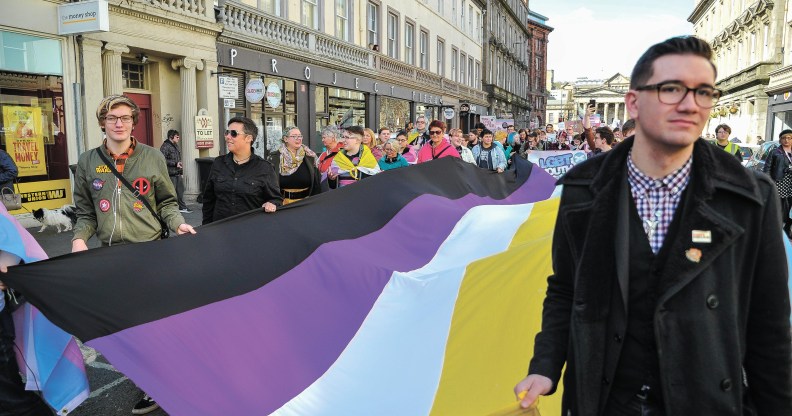One in four young, queer Americans are non-binary, eye-opening study finds

People hold a non-binary flag at Pride. (Stewart Kirby/SOPA Images/LightRocket via Getty)
Research has been released ahead of International Non-Binary People’s Day (14 July) which shows that a quarter of queer American youth are non-binary.
According to TIME, the Trevor Project surveyed 34,700 LGBT+ young people in the US in October and December last year, and found that overall 26 per cent said they did not fall into the binary categories of “male” and “female”.
Of those who said they are non-binary, almost three quarters said they use the term to describe their gender.
“Like the term transgender, non-binary can be a distinct gender identity, or it can be an umbrella term that refers to other identities outside of the gender binary, such as genderfluid, genderqueer, or agender,” the Trevor Project explained.
Many used other terms such as “gender non-confirming” (27 per cent), “genderfluid” (24 per cent), “genderqueer” (23 per cent), “androgynous” (23 per cent), “agender” (15 per cent), “demigirl” (10 per cent), “demiboy” (eight per cent), “genderflux” (four per cent) and “bigender” (four per cent).
As well as those who said they were non-binary, 20 per cent of all queer youth surveyed said they were questioning or unsure if they identified as such.
Trevor Project research scientist Jonah DeChants said: “More and more young people are taking control over their gender identity, and finding language and terms that resonate with them, and expressing that in the world in [ways] that we haven’t necessarily seen in the past.”
He said it was also enlightening to see that only half of non-binary youth said they also identified as transgender, adding: “We need to reevaluate and start to think about [trans and non-binary people] as communities that overlap heavily, but are not synonymous with one another.”
There was a wide array of pronouns and pronoun combinations used by the non-binary survey respondents, including they/ them (33 per cent), she/ they (20 per cent), he/ they (16 per cent), neopronouns such as xe/ xem (five per cent), or other combinations of the above (21 per cent).
But one thing respondents overwhelmingly agreed on, in an “emphatic response” rarely seen “in such a large sample”, was that using someone’s correct pronouns was vital in affirming their identity and supporting their mental health.
The research showed that non-binary respondents who said that “no one” referred to them by their correct pronouns were more than twice as likely to attempt suicide compared to those who said “all or most of the people” respected their pronouns.
DeChants said: “Pronouns are a small, easy step that anyone can do that can have an enormous impact on how LGBT+ people, trans and non-binary people feel in any given space… That is a key takeaway for me — that we can all be that person who provides that respect and affirmation for the trans and non-binary people in our lives.”

